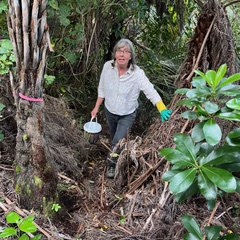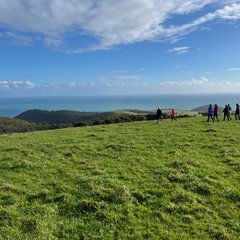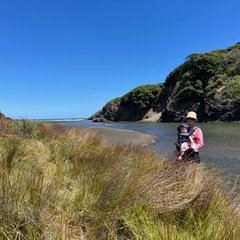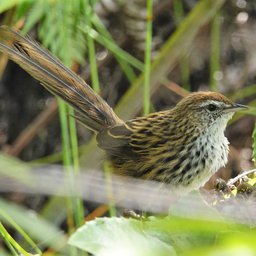



What started as a family-led conservation project in Anawhata among siblings has grown into a wider community effort to restore bush health and protect native wildlife, including mātātā, one of the Waitākere Ranges’ most elusive species. Formed in 2020, the Friends of Anawhata group, which began with five siblings managing pest control on their shared family land, now involves 14 households in the Anawhata area, with more showing interest.
According to founding member Sara Rishworth, several households were already carrying out pest control independently before the group formed. “Friends of Anawhata has helped bring those efforts together, motivating and connecting the community not just through conservation work but through neighbourly support in many ways - something that became especially important during the cyclone in 2023,” she says.
As part of their conservation work, the group maintains a network of bait stations and trapping lines targeting rats, stoats, weasels, possums and wasps. And on some properties, Goodnature trapping techniques, which include humane self-resetting traps, have been successfully implemented, helping to significantly reduce pest numbers further.
Each year, the group also runs organised wasp control days, setting protein-based baits across the area during peak wasp season that help knock down nests.
According to Sara, these events have become a well-established part of the community’s conservation calendar, drawing a strong turnout from both permanent residents and holiday homeowners.
While the group’s pest control work supports a wide range of native species, the discovery of mātātā (aka fernbird) in the area has given their efforts particular focus.
The mātātā is a cryptic, ground-nesting bird found only in specific wetland and scrub habitats across Aotearoa. Once widespread, they’ve disappeared from large areas of New Zealand with populations continuing to decline. “Finding out mātātā were present several years ago during biodiversity monitoring really strengthened our motivation to keep going because it’s proof that what we’re doing is making a difference,” says Sara. “We’re keeping pest numbers down and slowly building conditions where native birds, like the mātātā, have a better chance of survival.
The group holds an annual meeting each November to share knowledge and plan conservation efforts. And this year’s meeting will focus on learning more about the mātātā and exploring where else it may be present in the area, as part of growing efforts to support the species
alongside broader habitat restoration work. “Our hope is that in another five or ten years, we’ll hear more birdsong in the bush again.” Friends of Anawhata collaborates with Auckland Council, Regional Parks rangers, and the Pest Free Waitākere Ranges Alliance, receiving support and resources for their work.
How you can help mātātā
● Keep dogs on a lead and out of wetlands and scrub areas.
● Trap predators like rats, stoats and weasels in your backyard using safe, humane traps.
● Plant native shrubs and grasses to help create safe, sheltered habitat.
● Stay on marked tracks to avoid disturbing nesting sites.
● Join or support local conservation groups working to protect mātātā and other native wildlife.
Get involved
● Connect with groups in the Waitakere Ranges at pfwra.org.nz/find-your-people.